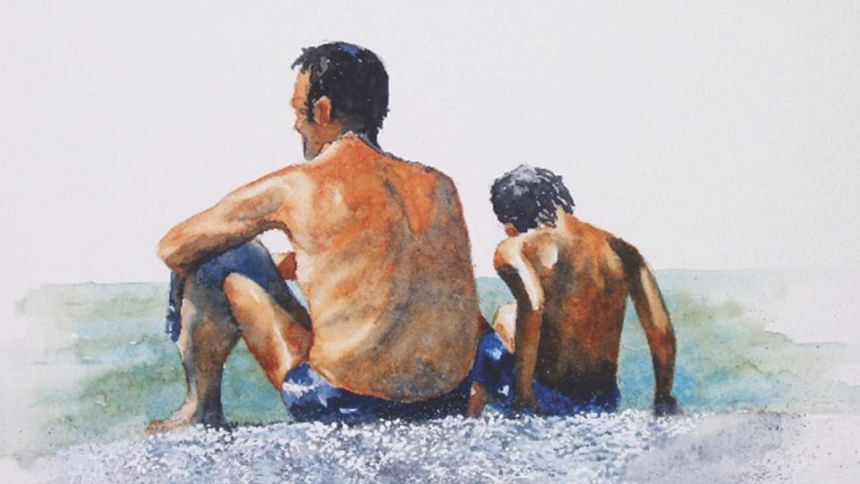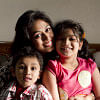The burden of 'manning up'

As an only child, and the only one in my entire extended family for quite a few years, I've spent a lot of time with my parents alone. Watching television snuggled between my parents or grandparents; talking to them for hours; rubbing their feet when they were tired from work. On quite a few of these occasions, my father will say something that he means as a compliment, but one that takes me by surprise every time. He wonders aloud if I'd still be spending time with them this way if I were a son. I argue, every time, that that's beside the point.
I noticed a similar trend in the ads and infomercials that flooded the media this past week in celebration of Father's Day. Nearly every commercial focused on the bond between a father and a daughter, reflecting the common idea that fathers can be openly affectionate only with their daughters, while the 'father-son' bond relies more on "manly" dynamics of support, solidarity, and gruff practicalities. By prioritising power over kindness, and mechanical rationality over emotions, fathers all too often tend to decide what kind of personalities their sons should embrace. In the worst of circumstances, it is these imposed ideals of manhood that encourage traits of domination and cruelty in many men.
A study "Understanding Masculinity: The Role of Father-Son Interaction on Men's Perception of Manhood (2009)" carried out by the University of Denver explains how fathers leave a much more significant impact on boys' ideas of gender roles than friends or the media. These interactions form the mental representations of "masculinity" for sons, which they in turn respond to. The ideals change into habits and, once emulated enough times, they become institutionalised. The idea of masculinity that takes root in one household becomes embedded in the social fabric, shaping the wider cultural definition of what it means to be a man. It is these imposed ideals of power, infallibility, and repression of emotions that contribute to the lack of empathy seen in many men, according to the study. It is also what heavily influences the idea of "girl-watching" not as a form of harassment, but an element of the power that is seen by many as the birthright of all men. The result is the misogyny, sexism, and even gender-neutral cruelty grasping parts of our society. For all our achievements, girls are still forced to drop out of school or work by domineering fathers and husbands, violence against women is rampant and manifold, and gang violence has seen a significant rise in the past year.
Father-son dynamics that promote toxic ideals of masculinity are all too common in popular media as well. Fans of Harry Potter will remember the arrogance of Draco Malfoy - a gift passed down from his proud, insensitive father. Lucius Malfoy's ceaseless exploitation of wealth and political clout, and his haughty treatment of everyone around him cast a shadow over Draco from a young age, who mirrors the same behaviour as a bully in school. Draco regularly throws around the line "Wait till my father hears about this" to cover up for all his misdemeanours against students and teachers alike. But his true failure as a villain is proved when he is marked as a Death Eater – yet another legacy from his father – and ordered by Lord Voldemort to kill Albus Dumbledore. Draco crumbles under the pressure, realising eventually that he cannot live up to his father's standards of cruelty. This turn of events highlights another outcome of the effects of imposed "manliness" – when the son doesn't agree with the father, when his natural character contradicts the one that he is expected to have, confusion, frustration and psychological pain are often the results.
A friend of mine, a 17-year-old at the crucial phase of choosing an academic path, was recently telling me how hard it is for him to talk to his father. His father doesn't outwardly make demands, but often asks him to "man up" in situations that call for more open exchange of their emotions. "His definition of 'manning up' is different from mine," my friend tells me. "He wants me to get a particular kind of job, go to a particular school. But it's more important for me to be a humble person and pursue my passion, which my father thinks is a waste of time." As someone who knows both this boy and his father very well, it was upsetting to see how their respective definitions of being a 'man' and a good human being aren't all that different. Their relationship is devoid of any negative influences or untoward expectations; but it's also devoid of open, meaningful communication.
Both my best friends are men. While picking their brains on this subject for an insider's perspective, I asked them if they've ever felt similarly pressurised by their fathers. "I've never felt that kind of pressure, and that helped shape who I am. I've never looked at anyone through stereotypical gender roles. I've never judged others for their choices," one of them shares.
The other friend explains how his notions of manhood were subconsciously shaped by his father in a positive way. "My father had to fend for himself and our family completely on his own. My Nana was more proud of him than his own sons. He inspires everyone around him through his hard work. I want people to have the same impression about me too, someday," he shares. These stories show how fathers, in their capacities as role models, can teach their sons to be kind and to take care of others, instead of focusing on the template ideals of robotic "masculinity".
It confuses me when my father asks whether a son can be as affectionate with him as I am as a daughter. Not because I don't agree with his ideas of what it means to be a man, but because we spent about two years apart once when I was a teenager. He had moved to Thailand to take care of my grandmother, his mother, as she battled with cancer in a hospital in Bangkok. Today, he spends more time with my Nanu than my mother, actively participating in all her social activities. He watches everything from Harry Potter to sappy Nicholas Sparks' movies with me. It is these outward shows of affection, kindness and empathy that helped form my definition of a man. It's about time that fathers promoted more of these qualities in defining "manhood" to their sons. This society, darkening more and more each day with violence and stunted liberty, needs such men now more than ever before.
The writer is a member of the Editorial Department of The Daily Star.

 For all latest news, follow The Daily Star's Google News channel.
For all latest news, follow The Daily Star's Google News channel. 








Comments